ARTICLE AD BOX
Kostas Koukoumakas
In Athens

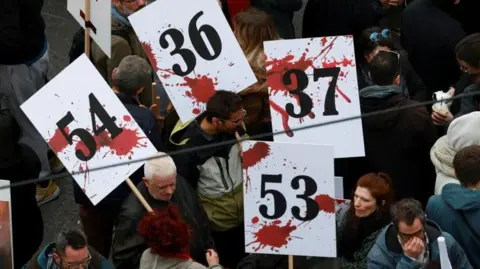 Reuters
Reuters
Protesters in Athens held up placards with numbers to remember the 57 who died
Greeks are holding their biggest protests for years and taking part in a general strike to mark the second anniversary of a rail disaster that left 57 dead and dozens more injured.
"I am here in memory of the people who were killed in the train crash. We demand justice," said 13-year-old Dimitris who had come with his father Petros Polyzos to the largest rally in Greece, in Syntagma Square in downtown Athens.
It was during the night of 28 February 2023 that a passenger train packed with students collided head-on with a goods train near the Tempi gorge in central Greece.
An inquiry concluded on Thursday that the accident was caused by human error, poor maintenance, and inadequate staffing.
The report by Greece's Air and Rail Accident Investigation Authority warned that the safety failings exposed by the crash had not yet been addressed: "Those children were killed because the train was not safe," said the authority's chief Christos Papadimitriou.
The Tempi disaster shocked Greeks with many accusing their conservative government of doing too little to shed light on the causes of the tragedy. There is a widely held belief that the government has sought to cover up the role of high-ranking officials.
Watch: Protests in Athens descended into violence
The entire centre of Athens was crowded with people of all ages and all walks of life, with many saying they were attending a demonstration for the first time in their lives.
By early afternoon, tempers flared and clashes broke out with police. Petrol bombs were thrown and police used tear gas.
Dmitris and his father were among many protesters in Athens, wearing t-shirts that read "I have no oxygen - justice to the end", referring to the 57 who died.

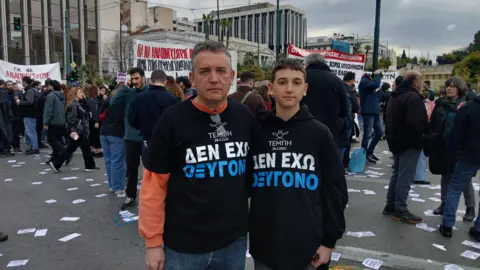 BBC/Kostas Koukoumakas
BBC/Kostas Koukoumakas
Dimitris, 13, and his father Petros Polyzos wore t-shirts that read "I have no oxygen"
Rallies were being organised in 346 cities, across Greece in Thessaloniki, Ioannina, Patras and Larissa, as well as in cities across Europe, including Brussels, Rome and several cities in the UK.
The passenger service from Athens to Thessaloniki was crowded with students returning to university after a holiday for Greek Orthodox Lent when the train collided with a goods train on the same track outside Larisa.
Seconds afterwards a fireball almost completely destroyed the first two carriages of the train.
In Athens, protesters held placards reading "My child, call me up when you arrive" and "No cover-up".
Dina Gazi, 62, held white balloons with the names of those who died in the accident. "I firmly believe that the government is covering up those responsible for the accident", she told BBC. "We demand that all the evidence come to light."
Shops in the centre had their shutters down, many with messages of sympathy and support in their windows, and ordinary people did not go to work.
Schools were closed, flights and trains cancelled, and the only public transport still operating was taking people to and from Syntagma Square.
Taxi drivers promised to take people to the protest without charge.

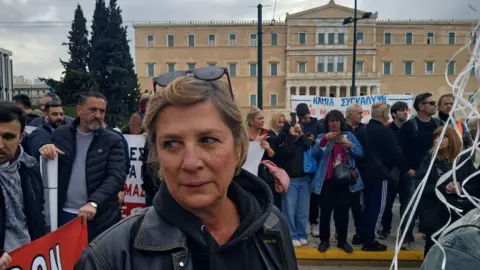 BBC/Kostas Koukoumakas
BBC/Kostas Koukoumakas
Dina Gazi stood outside parliament holding white balloons with the names of those who died
In a post on Facebook, Prime Minister Kyriakos Mitsotakis said that everyone's thoughts were with the families of the 57 victims who died, as well as with the wounded and those who survived but carried the memory of that night.
"Nothing will ever be the same any more," he added, speaking of "fatal human errors coupled with chronic shortcomings of the state".
In office for almost six years, this is the first time since Mitsotakis was elected that he has been in such a difficult political position. He promised to move "more dynamically and quickly" to bring about modern and safe trains.
For Greeks this mass protest was unusual in that it was unrelated to the economy and their personal finances.
Thursday's inquiry found that millions of euros had been paid out to cover the installation of safety systems along the railway, but that the project remained incomplete due to corruption and bureaucracy.
Relatives of those killed in the crash believe the goods train may have been carrying contraband fuel on behalf of a smuggling ring.
"It is impossible to determine what exactly caused [the fireball], but simulations and expert reports indicate the possible presence of a hitherto unknown fuel," the report found.
"Serious information went missing because the site of the accident was not sealed," experts say, increasing public anger and heightening speculation of a cover-up.
Government spokesperson Pavlos Marinakis denied there was a cover-up and said the allegation was not backed up by the report.
Further allegations have surfaced suggesting orders were given to clear the crash site and "landfill" it days after the disaster, which meant that evidence disappeared. But Marinakis said the inquiry report concluded that no political directive was give to alter the scene.
As he stood in the midst of Friday's protest in Syntagma Square, Pavlos Aslanidis spoke about the death of his 26-year-old son Dimitris in the Tempi accident.
"I don't know how I find the strength to stand," he told BBC.
"My son gives me the strength. Otherwise, I wouldn't be here today demanding justice."

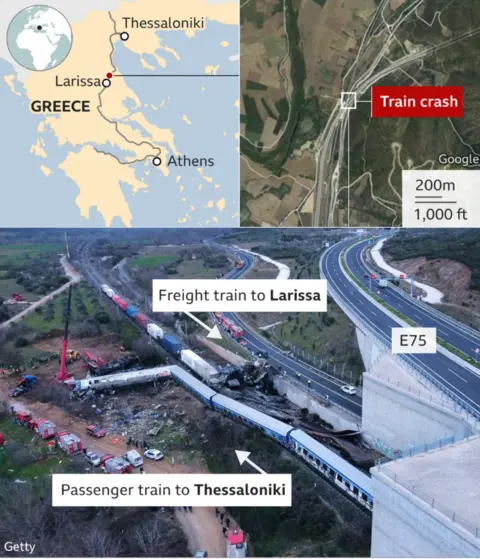

 3 months ago
22
3 months ago
22
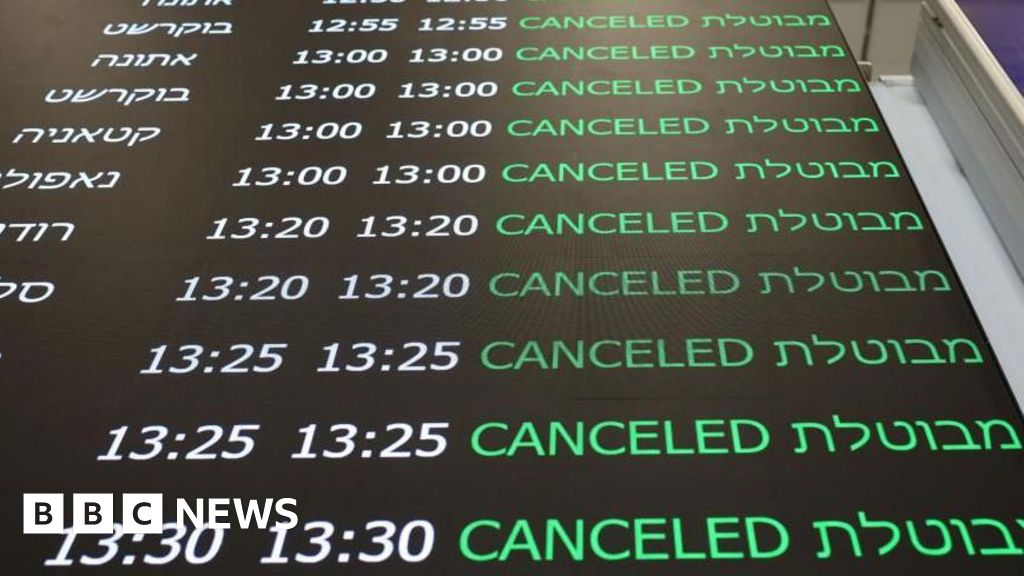
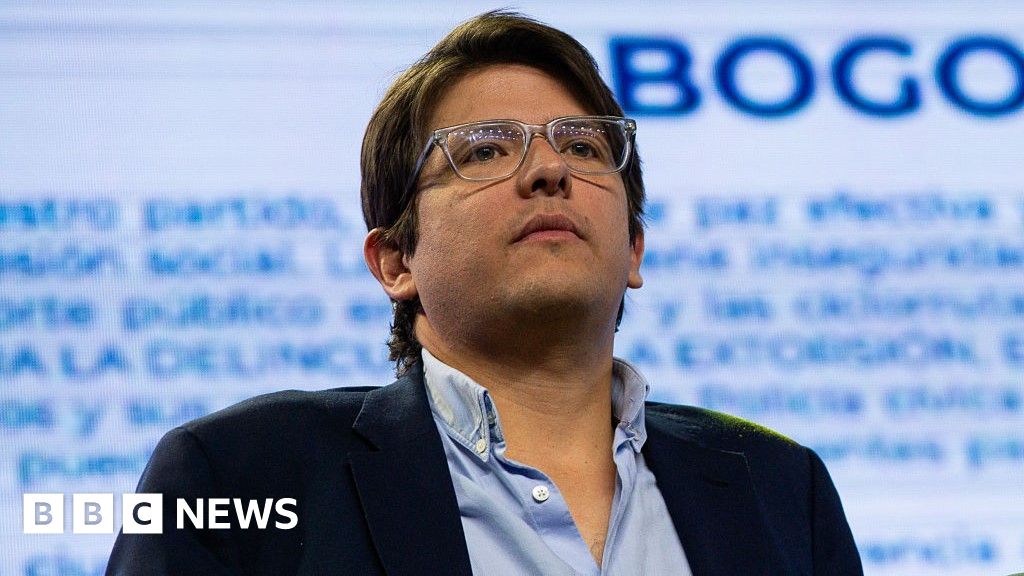






 English (US) ·
English (US) ·